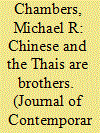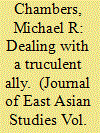| Srl | Item |
| 1 |
ID:
075496


|
|
|
|
|
| Publication |
2005.
|
| Summary/Abstract |
During the late 1970s and 1980s, the Chinese and Thais forged a close, friendly relationship based on their security cooperation in an informal alliance against Vietnamese regional hegemonism. In the 1990s, after the end of the Cambodian conflict and the Vietnamese threat, the Sino-Thai cooperative friendship became deeper and broader, rather than dissipating. How are we to explain the closeness of Sino-Thai relations today? While the dynamics of the international political structure in East Asia have played a critical role in shaping the relationship between these two countries since the founding of the People's Republic of China, the emerging regional international structure-particularly the rise of China-provides indeterminate incentives. Thailand could balance against or bandwagon with rising China, or try to hedge its bets; nor does the emerging structure direct how the Chinese will wield their growing influence and power over their neighbors. This article argues that the best explanation rests in a combination of the structural argument (the rise of China) with the desire of both countries to maintain the mutually beneficial partnership they constructed during the 1980s, in particular Thailand's role as a link or facilitator between the PRC and ASEAN.
|
|
|
|
|
|
|
|
|
|
|
|
|
|
|
|
| 2 |
ID:
061221


|
|
|
|
|
| Publication |
Jan-Apr 2005.
|
| Summary/Abstract |
Fearing war on the Korean peninsula as a result of the current nuclear crisis, China has attempted to restrain its risk-taking ally in North Korea and push it toward a negotiated solution. In the process, Beijing has reneged on security commitments made in its bilateral alliance with Pyongyang. We should not be surprised by this behavior because China has acted similarly in other alliances with Asian neighbors. In particular, the PRC has demonstrated a wariness of being dragged into unwanted conflicts, has (since the economic reforms began in 1978) placed its own strategic economic development interests over fulfilling security pledges to allies, and has taught unruly allies a lesson for defying Chinese interests and advice by allowing them to be bloodied in combat. China's refusal to honor its security commitments in order to restrain North Korea and avoid entrapment in an undesired war raises the issue of the future of this alliance.
|
|
|
|
|
|
|
|
|
|
|
|
|
|
|
|
| 3 |
ID:
064987


|
|
|